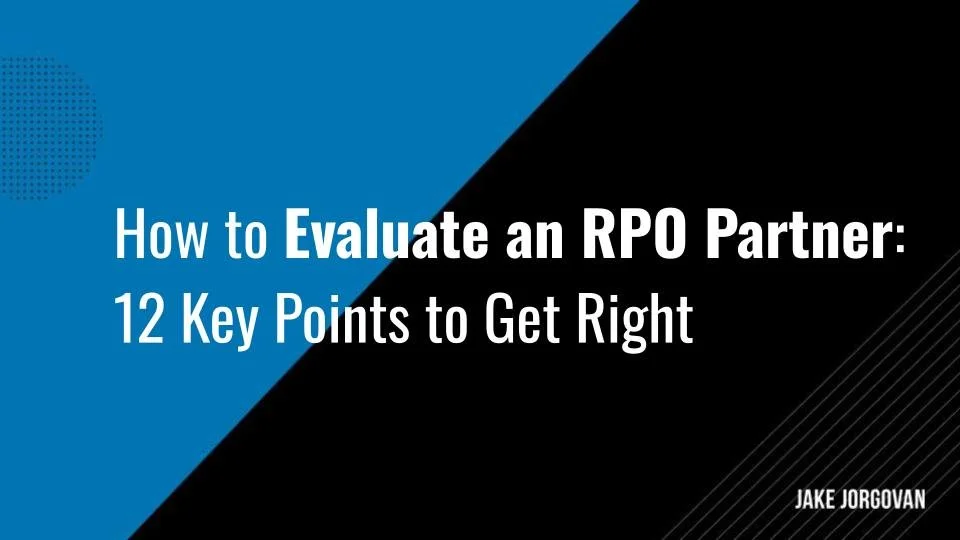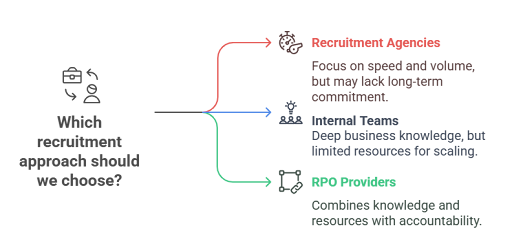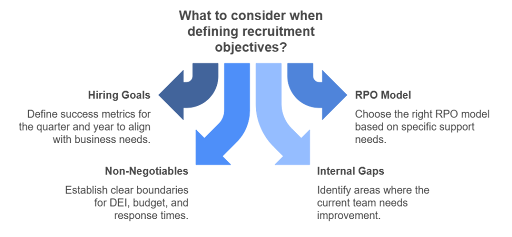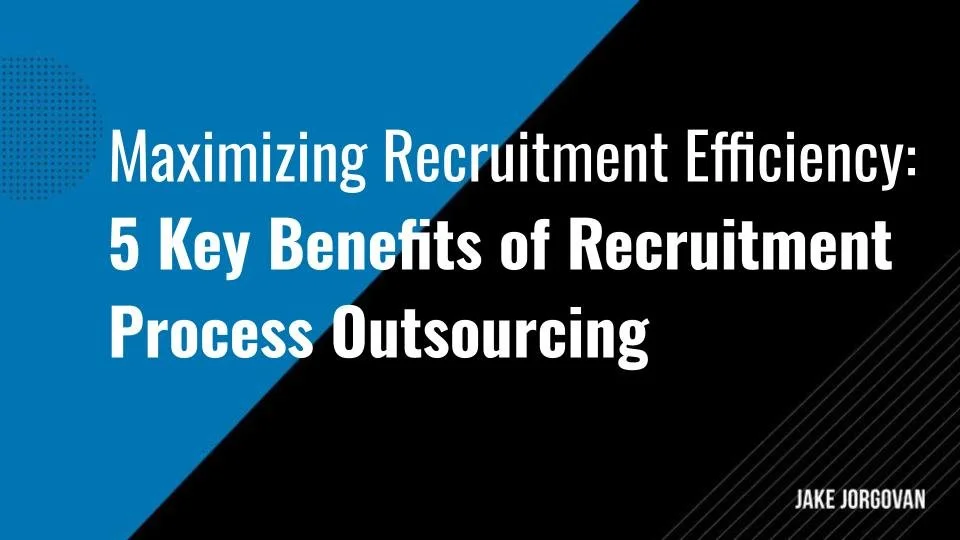How to Evaluate an RPO Partner: 12 Key Points to Get Right
Recruitment Process Outsourcing (RPO) providers promise a lot, but few actually deliver.
If you’ve led a hiring cycle that dragged on (too slow, too expensive, too disconnected), you know what’s at stake. Your team burns out. Budgets get stretched. And the roles you needed filled last quarter are still sitting open.
What makes it worse: only 42% of companies are satisfied with their RPO provider, and 60% say the partnership fails to meet expectations.
If you’re a Chief Human Resources Officer, Head of Talent, or People leader, this is your blueprint to evaluate an RPO partner with clarity. We’ll cover the right questions to ask, what to expect, and where most vendors fall short.
Let’s make this decision count.
P.S. Looking for the right RPO partner? We’ve shortlisted 12 top RPO providers that stand out for their expertise, transparency, and results. Explore the firms that can help you hire smarter, faster, and with less friction.
TL;DR
Pressed for time? These are the signals to watch for the right RPO partner:
Strategic alignment with your hiring goals.
Proven experience in your industry or role type.
Flexibility when priorities shift or headcount freezes.
Real visibility into sourcing, metrics, and performance.
Candidate experience that fits your brand, not theirs.
Clean integration with your tech stack.
Clear compliance process and DEI ownership.
References that say more than “they were fine”.
Accountability is tied to results, not just activity.
If a provider can’t check most of these boxes, move on.
What is an RPO Partner?
Recruitment Process Outsourcing (RPO) is a full-service model where a third-party team takes ownership of part (or all) of your hiring process. That includes everything from sourcing and screening to reporting, onboarding, and optimization.
An RPO partner is the engine behind that model. Beyond supporting your recruiters, they show up with their own operators, systems, and accountability. They work inside your stack, align with your hiring goals, and take pressure off your internal team without dropping the ball.
How Does RPO Compare to Traditional Recruiters or In-house Teams?
Recruitment agencies fill roles. Internal teams manage the process. RPO partners combine both and take full ownership of outcomes.
Here’s the breakdown:
Recruitment agencies work on a role-by-role basis, often focused on speed or placement volume. Their success is usually tied to commissions, not long-term outcomes.
Internal teams know the business deeply, but often lack the bandwidth, tooling, or sourcing reach to hire at scale or on tight timelines.
RPO providers embed within your team and take end-to-end responsibility, from sourcing to metrics. They deliver results, not just resumes.
If you're constantly shifting between overloaded internal recruiters and high-cost agencies, RPO bridges that gap with accountability built in.
Why Companies Turn to RPO?
96% of companies using RPO have seen better hiring outcomes, 58% report faster time-to-hire, and 42% have reduced their overall recruitment costs.
Let’s take a closer look at the strategic advantages of Recruitment Process Outsourcing and why more companies are making the switch, when it’s done right:
Scalability: Need to double headcount this quarter, then pause the next? RPO partners flex with your hiring cycles without starting from zero every time.
Expertise: You get specialized teams with experience sourcing for complex roles, across regions, and in industries with real compliance or technical challenges.
Cost-efficiency: Instead of stacking spend on multiple vendors or burning out internal staff, you centralize hiring efforts under one accountable model. Usually with a clearer ROI.
Why does choosing the right RPO partner matter?
There’s a big difference between outsourcing tasks and building a partnership that drives hiring outcomes. Some RPO providers just follow instructions, while others improve the entire system.
If you want better quality hires, faster time to fill, and real alignment with business goals, the right RPO partner can help.
But the wrong one? That’s when you get recruiter churn, dropped candidates, missed SLAs, and frustrated hiring managers.
Here’s what’s really on the line:
Hiring performance: Great RPO partners sharpen your recruitment strategy, streamline execution, and improve candidate quality across every touchpoint.
Internal trust: When hiring processes break down, so does confidence across teams. A reliable partner protects the employer brand and keeps stakeholders aligned.
Business impact: Missed hires cost more than time; they delay growth, slow revenue, and affect the entire org. You need a partner who understands the stakes.
If you're only evaluating based on price or speed, you’re missing the bigger picture. What matters is their ability to support your current recruitment challenges and evolve with you as hiring goals shift.
Pro Tip: Before you shortlist any RPO, ask yourself: “Would I trust this team to represent my company in front of a candidate I really want to hire?” If the answer’s not a clear yes, keep looking.
How to Prepare Internally Before Choosing an RPO Provider: What To Consider
Before you evaluate any RPO partner, pause and get your own house in order. These key preparation steps can help you define success and avoid mismatched expectations down the road.
Start by defining your objectives:
Your hiring goals: Are you scaling across multiple regions? Filling specialized roles? Cutting time-to-fill? Define what success looks like this quarter and next year.
The RPO model you need: Are you looking for full-cycle support? Project-based help for a new market launch? Or temporary help for a hiring spike? Be specific.
Non-negotiables: These are the lines you won’t cross, like DEI commitments, maximum spend per hire, or time-to-response benchmarks. Put them on the table early.
Internal gaps: Where is your current team falling short? Maybe it’s sourcing. Maybe it’s employer branding. Maybe it’s analytics. Spell it out clearly.
Your hiring gaps might only be the surface. Some RPOs can go deeper. The Principle Group put it clearly on LinkedIn:
“...some RPO providers use their knowledge of your business, as a strategic partner, to support you in other ways. This could include auditing and setting up your shared service model, taking responsibility for offers and onboarding, assessing your Executive Board, streamlining HR processes and procedures, creating a succession plan incorporating both internal and external talent, designing and implementing a graduate intake programme… the list goes on.”
Core Criteria to Evaluate an RPO Partner: 12 Key Points
Most RPO pitches sound good on paper. But when it’s time to execute, a lot of providers fall short.
These are the areas that separate vendors from valuable partners.
1. Expertise in Your Industry and Roles
Let’s start with the basics. If an RPO partner doesn’t understand your space, they’re going to waste your time. You want recruiters who know the hiring patterns, job boards, salary ranges, and compliance details of your sector.
Having relevant industry experience is especially important if you operate in regulated industries like healthcare, pharma, or finance. Even more so if you're hiring for specialized or technical roles that require nuanced vetting.
Review their track record. Ask for relevant case studies. Beyond potential, you’re looking for proof.
Need help narrowing the field?
Explore these curated lists of top RPO providers by industry:
2. Talent Acquisition Strategies and Capabilities
A solid RPO partner should already have the sourcing engine you’re trying to build internally. That includes talent pipelines that go beyond what's public, outreach strategies that target both active and passive talent, and recruiter teams who actually understand how to convert interest into intent.
Ask how they deploy niche sourcing strategies. Right now, 94% of recruiters rely on social platforms like LinkedIn, Facebook, and X (formerly Twitter) to source candidates. If your RPO can’t show a smart or strategic approach to digital sourcing, they’re behind.
As HR expert Stacey Cadigan notes, top RPO providers go beyond basic sourcing with more advanced tactics:
“For challenging roles, ready access to a channel with expert-level headhunting capabilities (including the ability to leverage an executive search arm) is another way some RPO providers are adding unique value.”
3. Scalability and Flexibility
Hiring needs fluctuate. One quarter, you're filling 15 roles across product and operations. Next quarter, you’re on a freeze, except for that one senior-level hire that suddenly becomes a priority.
Your RPO partner should be able to pivot without friction. That means scaling teams up or down without compromising quality, reallocating recruiters based on urgency, and handling one-off asks without going through layers of approvals.
If their model is rigid or too locked into static scopes, it’ll slow you down when you most need speed.
Pro Tip: Ask for real examples of how they adjusted recruiter allocation mid-contract. Flexibility it's proven through how they’ve handled shifting priorities under pressure.
4. Operating Model
This is where a lot of misalignment happens. A glossy proposal won’t help if the RPO's way of working doesn’t match how your team runs.
Are their recruiters embedded in your workflows, or operating from the outside with check-ins? Do they use your Applicant Tracking System (ATS) or bolt on their own systems? How do they report: daily dashboards, weekly syncs, or reactive updates?
The more embedded and accountable they are, the less lift required from your internal team.
5. Global Presence
If you’re hiring across markets, you need a partner that can handle more than English resumes and PST time zones.
Global RPOs should bring regional expertise, multilingual sourcing capabilities, and familiarity with labor laws across multiple countries. Bonus points if they’ve built teams across continents before.
Ask about local compliance processes, hiring timelines in each region, and how they handle distributed communication. If you hear vague generalities instead of specific experience, that’s a red flag.
6. Candidate Experience and Employer Branding
Every candidate interaction reflects on your brand, even if the hire doesn’t happen. Your RPO partner should act like a brand ambassador, not a transaction machine.
That includes how they write outreach, conduct interviews, communicate delays, and close feedback loops. In fact, candidate experience plays a direct role in offer acceptance: 66% of candidates say a positive experience influenced their decision to take a job.
If your RPO can't define what kind of experience they're designing (and for whom), they’re not doing the job right.
Pro Tip: A strong recruitment process doesn’t stop at the offer stage. Ask how they tailor candidate experience by persona, because engineers and senior executives don’t expect the same journey.
7. Technology Capabilities, Reporting, and a Data-Driven Approach
If you can't see what’s happening inside your hiring funnel, you can’t improve it.
A reliable RPO partner should bring visibility, not just activity reports, but real-time data that drives informed decisions.
Look for compatibility with your ATS and existing tech stack. Bonus if they bring tools that enhance your entire recruitment process without disrupting it: dashboards, pipeline visibility, and automated updates that save your team time.
Artificial intelligence is also making an impact. More RPOs are using AI to match high-quality candidates faster, respond to inquiries, and streamline ops.
If an RPO is still stuck sending spreadsheets once a week, they’re not built for modern hiring.
8. Compliance and Risk Management
Hiring across multiple states or countries means playing by different rules. Your RPO partner should protect you on all fronts: from labor laws and background checks to DEI safeguards and data privacy.
Ask how they stay current with compliance standards. Look at how they vet candidates, handle sensitive information, and ensure your hiring process holds up under legal scrutiny.
Remember, this isn’t optional. Weak compliance is a lawsuit waiting to happen.
9. Consultative Approach
Instead of waiting for instructions, a great RPO shows up with ideas. They know what hiring looks like in your market, where processes break down, and how to fix them before those gaps cost you time or talent.
The strongest partners don’t just fill roles. They challenge assumptions, flag risks early, and help you rethink what good hiring actually looks like. That consultative mindset is what separates tactical support from strategic impact.
Look for signs they understand talent behavior, market shifts, and how your organization works internally. If they can tell you what’s not working before you ask, they’re on the right track.
Pro Tip: Test their consultative muscle early. Share a recent hiring challenge and ask what they’d do differently; great RPOs won’t hesitate to rewrite the playbook.
10. Transformative Ability
If you’re in a stage of business growth, shifting business models, or undergoing internal change, you need an RPO that can build with you, not just react. That means advising on tech adoption, redesigning workflows, and supporting the maturity of your talent acquisition process over time.
Ask what kind of structural improvements they’ve helped clients implement. Have they guided hiring teams through transformations? Helped move organizations from manual to automated systems?
Their answers will tell you whether they’re equipped to keep up or drive progress.
11. Operational and Cultural Fit
This one’s often overlooked, but it’s where many RPO relationships go sideways. Even if the model looks good on paper, misalignment in working styles, communication cadence, or company values will cause friction fast.
You want a team that integrates cleanly with your internal processes and mirrors the tone, responsiveness, and energy you expect from your own people.
Culture fit matters in every hire. In fact, 84% of recruiters consider it a critical factor when evaluating candidates, and your RPO should be able to assess for that with the same accuracy.
If they’re juggling multiple clients or rushing to close reqs, that precision goes out the window.
Neha Naik, CEO and Founder of RecruitGyan, puts it clearly:
“An agency (or RPO) may contribute to a higher turnover rate if its main objective is to fill a role. If the agency is working with multiple companies, your company may not get the personalized attention it deserves to find a solid match for your nuanced culture and long-term needs.”
12. Cost Structure and ROI Transparency
Price always matters, but so does clarity. Before signing anything, you should understand exactly how your RPO partner charges, what’s included, and how ROI will be tracked.
Ask about:
Pricing model: Fixed monthly, per-hire, hybrid?
What’s included: Tech access, ads, employer branding support?
Extras: Is anything billed separately, like assessments, relocation, or integrations?
Most importantly, ask how they track success. Cost per hire is just the start. You want visibility into candidate quality, retention rates, time-to-fill, and hiring manager satisfaction.
Pro tip: Measuring how your RPO partner performs is a core part of protecting your hiring strategy. This breakdown of RPO performance metrics and ROI highlights exactly what to track and why it matters.
Reference Checks and Performance Guarantees
A slick pitch doesn’t mean much if it doesn’t hold up in real life. Before finalizing any agreement, reference checks are your last filter, and they should go deeper than “Did they deliver?”
What to Ask in Reference Calls
Don’t settle for surface-level positive feedback. Go in with targeted questions:
How did the RPO handle unexpected hiring changes or business pivots?
Did they adapt to your internal systems or create more friction?
How responsive were they during high-pressure situations?
What was the candidate experience like from end to end?
Were hiring managers satisfied with the partnership, or did they disengage?
If a provider resists giving you direct access to past or current client references, that’s a signal. Good RPOs want you to hear how they operate from the people who’ve seen it firsthand.
SLAs and Performance Metrics
Any RPO worth your time should commit to concrete service-level agreements. Ask about:
Replacement policies for hires who don’t work out.
Fill-rate benchmarks are tied to role complexity and geography.
Candidate satisfaction tracking and hiring manager feedback loops.
Make sure you’re clear on escalation paths and accountability if performance dips. A partner who won’t put anything in writing isn’t really standing behind their work.
Key Questions to Ask Before Signing Anything
Proposals can sound great. Presentations can be polished. But the real test is how your potential partner answers the hard questions; the ones that uncover how they think, how they operate, and how they'll show up when things get messy.
These are the essential questions that separate surface-level capabilities from actual strategic value. Use them during RFPs, interviews, and reference calls to get beyond the pitch:
How will you quickly ensure we hire the right people with the right skills?
What’s your approach to filtering candidate submissions based on actual potential, not just buzzwords or keyword matching?
Can you help assess our overall talent acquisition maturity and recommend improvements?
How do you plug into our specific recruitment gaps or scale with changing demand?
What experience do you have hiring for our industry or roles with similar complexity?
How do you measure and improve candidate experience, and what do you do when feedback drops?
What innovative tools (AI, automation, analytics) are you using to improve quality and reduce time-to-fill?
How do you use talent insights to help us move faster without compromising on quality?
What’s your internal recruiter turnover rate, and how does it affect client results?
Do you manage delivery teams in-house or through external contractors?
How do you ensure your recruiters stay engaged, trained, and aligned with client expectations?
These key questions give you a window into how the provider treats its own people, and that always shows up in the quality of delivery. If their internal team is stretched thin, undertrained, or disengaged, it’s only a matter of time before that affects your hiring results.
And any expert voice on the matter would agree:
“...any recruitment company that can’t find, hire, develop, and retain an extraordinary workforce for itself shouldn’t be engaged to help you staff your company.” Larry Myler, Founder and CEO of By Monday, Inc.
Ready to make the right RPO choice? Use this checklist to evaluate your current or potential partner and ensure your recruitment strategy is built for long-term success.
When to Walk Away: Red Flags You Can’t Ignore
Even good sales decks can hide shaky delivery. But there are early signs that tell you when to cut the process short and avoid a long clean-up later:
They keep you in the dark: You ask about key metrics and get noise. You want visibility into the pipeline, and they offer a spreadsheet. A real partner makes it easy to see what’s working and what’s not.
Communication is messy or slow: You're left wondering who’s handling what. Emails go unanswered, updates arrive late, and nobody seems accountable. That's inefficient and a hiring risk.
Everything feels off-the-shelf: Interview flows, sourcing strategies, job templates; none of it adjusts to how your company works. You need someone who gets your org, not someone copy-pasting from another client.
Their reputation is either vague or suspiciously quiet: You look for case studies, testimonials, or client logos and find nothing. No proof, no examples, just claims. That silence says plenty.
The team keeps changing: You start with one recruiter, then another, then a third. Every switch drains time, context, and candidate trust.
They don’t understand your roles: You spend more time explaining job requirements than reviewing qualified candidates. If they can’t speak the language of your business, how are they selling it to talent?
Trust your gut. If you feel like you’re pushing for clarity, accountability, or effort early on, it will only get worse later.
Choose an RPO Partner that Performs
Hiring is too important to outsource blindly. You need an RPO partner who brings clarity, accountability, and real hiring outcomes instead of just headcount.
With the right partner in place, the shift is immediate. Your team moves faster, candidate quality rises, and reporting finally drives decisions. Hiring starts to fuel growth instead of holding it back.
And when the fit is wrong? You’ll feel it in churn, wasted spend, and a funnel that never quite delivers.
Treat this like any other high-stakes decision. The partner you choose will influence every hire that comes next.
Want to know more about what RPO brings to the table? Don’t miss out on the key benefits of Recruitment Process Outsourcing.
Frequently Asked Questions (FAQ’s)
What is an RPO partner?
An RPO (Recruitment Process Outsourcing) partner manages part or all of your recruiting process. They become a direct extension of your internal team, running functions like sourcing, screening, interviewing, and onboarding with the infrastructure to scale efficiently.
Is RPO only for large enterprises?
Not at all. While global enterprises use RPOs to manage volume, high-growth startups and mid-size companies rely on them to meet unique talent requirements without overwhelming internal resources.
How does an RPO strategy fit into long-term hiring plans?
RPOs do more than just plug hiring gaps. The right partner supports long-term success by improving recruitment efficiency, integrating better systems, and creating candidate experiences that evolve with your goals.
What are the different types of RPO models?
Most RPO models fall into one of three types. End-to-end RPO covers the full recruiting process across all roles. Project-based models focus on specific business initiatives, like launching a new division or hiring for a new region. Lastly, on-demand RPO delivers short bursts of recruiting support when your internal team is at capacity.
How involved should my internal team be with an RPO provider?
You’re still in control. Your team sets the direction, and the RPO executes. That includes aligning on systems, maintaining transparent communication, and preserving your company culture across every candidate touchpoint.
How do I know if an RPO partner is the right fit for my company?
Look for cultural alignment, proven expertise in your niche, adaptability to your workflows, and clear accountability. A great partner won’t need to be micromanaged—they’ll already be operating like part of your team.
What are the risks of choosing the wrong RPO provider?
Choosing the wrong RPO provider can lead to poor-quality hires, wasted time, and unnecessary budget spend. When the partnership fails, so does recruitment success. And the fallout hits your people, pipeline, and growth plans.





















